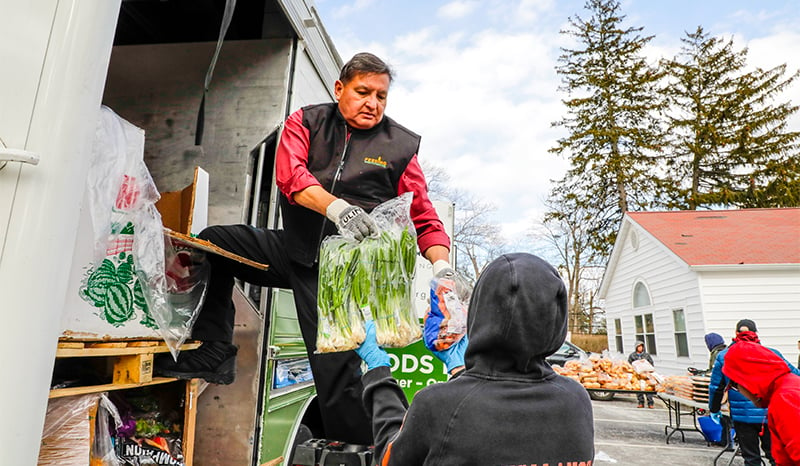
When most people think about the ways that we fight hunger in our communities, one thing that comes to mind is their local food pantry — and for good reason. Food pantries are essential in the fight against hunger for the nearly 40 million Americans facing food insecurity, and increasingly, they’re becoming mobile entities. In fact, of the 200 food banks in the Feeding America network, 170 had already set up mobile counterparts by 2016. Just as a traditional food pantry is a distribution center that delivers food directly to those in need, think of a mobile food pantry as having the same benefits and goals — only it’s on wheels.
Mobile food trucks enable efficient delivery of fresh food to people facing food insecurity via refrigerated trucks, which travel to designated distribution sites at scheduled times. Potential distribution locations include any site with a parking lot or open space, including places like community centers, houses of worship, libraries and schools.
Let’s explore three of the ways that mobile food pantries are helping in the fight against hunger:
They’re delivering nutritious food to the communities that need it most.
One major benefit of a food pantry on wheels is that it identifies local food deserts — areas where people have limited access to healthy food — and delivers food directly to citizens in those underserved communities. Hungry people can’t always travel to traditional brick-and-mortar food pantry locations, particularly if public transportation is subpar in the area, and mobile pantries reduce this barrier by bringing food directly to the areas that are in need. More than 23 million Americans live in food deserts across the country, and food pantries are a powerful force for reducing food insecurity in these vulnerable areas.
Mobile pantries are expanding public awareness.
Mobile food pantries are still a relatively new concept that not everyone is in the know about. However, the more popular they become, the more that public awareness about food insecurity and and its prevalence as an issue increases. The more that people know about how a mobile food pantry works, the more likely it is they’ll want to get involved in helping reduce hunger. Likewise, people in need will be more likely to take advantage of the services that mobile food pantries provide.
Food pantries are reducing food waste.
It’s estimated that 133 billion pounds of food is thrown out each year in the U.S. alone. This amounts to 30-40 percent of the food supply and an abundance of nutritious food that could help feed food-insecure families going to landfills instead.
Grocery stores and other places that sell food usually throw food items out as they reach their sell-by dates even though they’re often still perfectly safe to eat. Mobile pantries reduce food waste by securing food that local sources would otherwise throw out and provide fast and flexible delivery of perishable food to those in need. Mobile pantries offer those in need high-demand items that must be used quickly, including dairy, produce, grains, and meat products.
Confused by all of the different dates and terms used on the foods you eat? You’re far from alone! Check out our latest Food Dating Guide to learn more about what all of these package dates mean, along with our tips for safe consumption of various food items.
Where to find Feeding Westchester’s Mobile Food Pantry
Here at Feeding Westchester, our Mobile Food Pantry program is going strong in helping to reduce hunger throughout Westchester County. Typically, half of the people we serve through this program are children. Our Mobile Pantry began in 2014, and we currently make about a dozen weekly distribution stops including deliveries to the Yonkers Community Action Program, Bowen Memorial Baptist Church, Mount Vernon’s Cecil H. Parker School, and Ridgeway Alliance Church. Check out our full Mobile Food Pantry schedule, and feel free to contact us at MobilePantry@FeedingWestchester.org with any questions or mobile pantry site suggestions.






